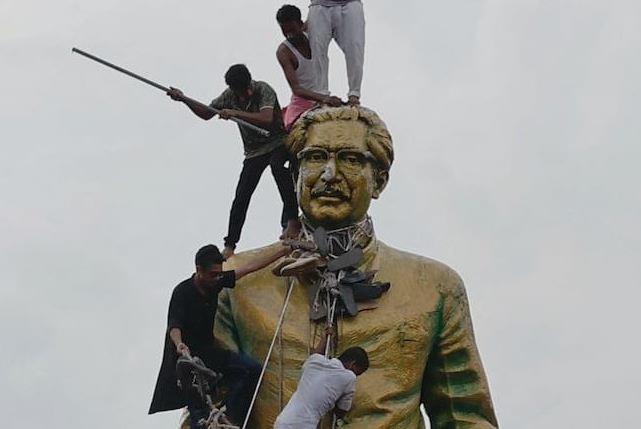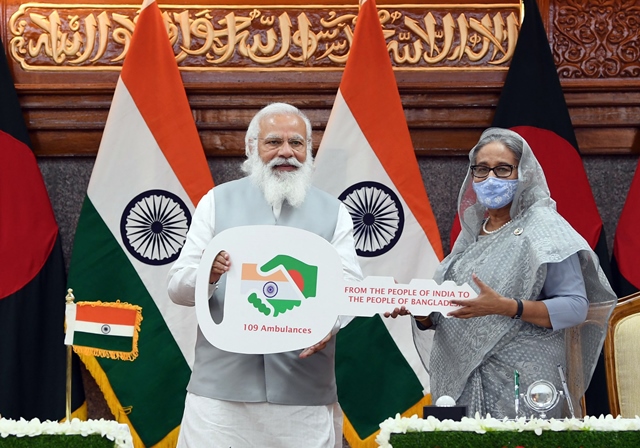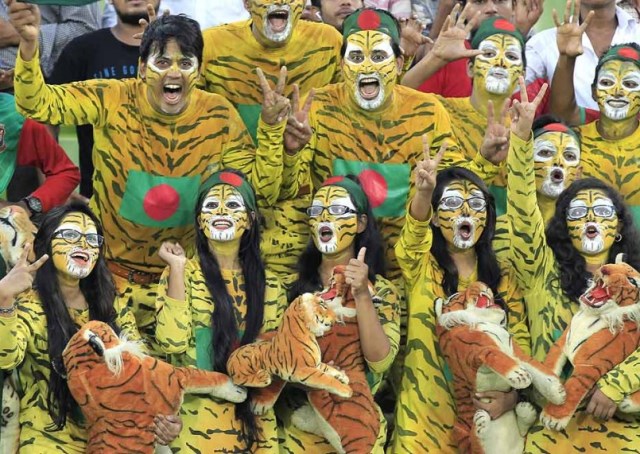Many in Bangladesh calling the shots now have in their wisdom liked the unrest, killings and chaos leading to a change in the government as “revolution.” Going a step further, they say the change amounts to the country’s second liberation. What, however, the world had witnessed during the protest period was great degrees of senseless violence, including the highhandedness of the state machinery in restoring order, communal strife and destruction of public and private property.
Without questioning the earnestness of participating students to eliminate the malice in the system and justification of protest points, it can be safely said, their movement was infiltrated by fundamentalists, communalists and lumpen elements. In fact, their actions gave the movement a bad name.
Marxist revolutionary Ernesto Che Guevara said: “The first duty of a revolutionary is to be educated. One cannot lead a revolution through common sense or gut.” Certainly, the Bangladeshi protesters have failed to live up to the Guevara standard. Guevara also said true revolutionaries would necessarily be “guided by a great feeling of love.” That was also lacking among the protesters. Then there is a great deal of controversy over describing the dethroned Bangladeshi leader now in exile as fascist. This calls for some cogitation.
A fascist has one too many abominable attributes. But basically, someone to be called a fascist will be found to be anti-liberal and anti-left. A fascist leader will be promoting a nationalist dictatorship and he will have a positive disposition to violence. Mass mobilisation besides, he will be prone to building himself as a charismatic authoritarian leader who overtly and covertly will stay engaged in snuffing out all critics at all times. Some leaders will wear democratic mask but their actions will give out their fascist bearings. Since her resignation as prime minister and the army aided fleeing the country for friendly neighbour India as a result of unrelenting protests turning violent with students in the forefront, Sheikh Hasina to her acute discomfiture finds that her father Sheikh Mujibur Rahman is called a fascist by several leaders of the interim government.
The present dispensation in Bangladesh is well aware that Mujibur Rahman’s place in the country’s history is secure. But why not make a campaign to give him a bad name so that he is at least half hanged. The liberals around the world were mortified the other day when the Attorney General of the interim government Muhammad Asaduzzaman told the country’s high court, among many other disturbing things of far-reaching political and social import, that the government wanted revocation of the 15th amendment of the Constitution declaring Mujibur Rahman as the ‘father of the nation.’ The AG while acknowledging Mujibur Rahman’s “contributions to our liberation war” says, the conferment of such a title to him “contradicts the spirit of constitutional inclusivity…. Moreover, the amendment betrays the sacrifices of martyrs like Abu Syed and Mugdho.” The two were student leaders.
Later at a Press conference, the AG made the emphatic statement that the government rejects the proposition that all that led to the emergence of Bangladesh was due to one individual. What regrettably the AG failed to appreciate was that how much the present administration might try to besmirch the image of Bangabandhu, his place remains secure in the pantheon of modern world political leaders. Even among those opposed to the Awami League, which is to be faulted on many counts, governance standard in particular and the Exchequer being drained of funds because of corrupt practices of some ministers and bureaucrats, are to be found many strongly disapproving of the AG’s snide attempt to make references to some martyred student leaders in the same breath as Mujibur Rahman.
As it would happen, ahead of the AG deliberating on the alleged infirmities of the 15th amendment, the government had allowed removal of Mujibur Rahman portrait from the Durbar Hall of Bangabhavan and government offices, for being a ‘fascist.’
ALSO READ: Muhammad Yunus – Walking A Tightrope
In a shocking demonstration of heroics at the height of student agitations across the country, misguided students along with gatecrashing lumpen pulled down the statues of Bangabandhu at several places. Their attempt was to diminish the physical visibility of Mujibur Rahman. Many observers of the Bangladeshi scene fear that there may already be insidious moves to rewrite the history of the country born in March 1971 following a brutal war Bengalis fought against the Pakistani army, undermining Mujibur Rahman’s central role in ending Pakistani tyranny.
In fact, there is reason to be concerned about the AG saying in his deposition in the court that in no way the 1971 victory was to be exclusively credited to one individual. Is not that enough of a hint that in the coming days the country’s official history would undergo revision? The interim government considers the conferment of ‘father of the nation’ title to Mujibur Rahman in the preamble of the constitution using the 15th amendment amounts to “deviation from the original spirit of the constitution,” an official spokesman contended recently.
Let’s not get into the semantics of the 15th amendment that its continuation is a negation of the “spirit of liberation war” and an assault on “democracy and the rule of law,” as alleged by the interim government. What, however, is for sure is that the country’s political, social and economic structure will undergo profound changes and for the worse if the pillars of secularism, socialism and Bengali nationalism are removed from the Constitution. It is disappointing that in this time and age, the argument is advanced that the idea of secularism should be dropped in favour of unwavering faith in Allah since around 90 per cent Bangladeshis are Muslim.
According to the 2022 census, of the country’s total population of 165.15 million, the Hindus constitute 7.95 per cent. Even under the oversight of Sheikh Hasina, the Hindus would sporadically come under attack and their places of worship vandalised because of the intolerance of fundamentalists. It was not for nothing the government in October 2022 made a proclamation guaranteeing the security of the Hindu minority community.
As it would happen, for no reasons, the Hindus became the target of attack and some of their religious places were damaged during the July-August agitation that saw the end of Sheikh Hasina regime. Unfortunately, instead of sustaining a genuine campaign against religious intolerance, the country’s AG was advocating deletion of ‘secular’ and ‘socialism’ in the preamble of the Constitution. Yes, there were occasions when chief adviser Muhammad Yunus would visit Hindu temples and give messages that all minority communities would be ensured peaceful living and their properties protected.
Besides the Hindus, the Christians in Bangladesh too have the feeling of insecurity. All the minority communities want Yunus not to stop at making symbolic visits to Hindu places of worship and politically correct statements, but met out exemplary punishments to the miscreants. Donald Trump during his election campaign expressed his disappointment over the persecution of the Hindus and the Christians in Bangladesh in strongest possible words. Aware that Bangladesh is earning a bad name globally, the media savvy Yunus dismissed attacks on Hindus as baseless propaganda.
No one knows for sure how much authority Yunus actually wields in the government. The Nobel laureate was chosen to create ‘ideal condition’ to hold the next parliamentary elections because of his reputation as a liberal economist who was a banker to the poorest of the poor. Did Yunus himself choose the three new advisers with alleged links to extremist groups or was there pressure on him from an unidentified power centre to induct the controversial trio? What certainly did not enhance the image of the interim government was the open voicing of disapproval and disappointment over the new appointments by student groups who engineered the fall of Sheikh Hasina government.


